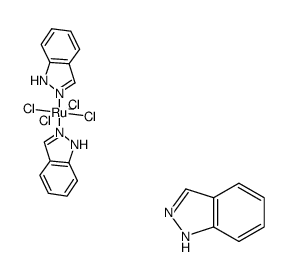124875-20-3
| Name | trans-RuCl4(1H-indazole)2 |
|---|---|
| Synonyms |
indazolium trans-[tetrachlorobis(1H-indazole)ruthenate(III)]
KP 1019 indazolium trans-[tetrachloridobis(1H-indazole)ruthenate(III)] indazolium trans-[tetrachlorobisindazole ruthenate(III)] KP1019 |
| Description | KP1019 (FFC14A) is a Ru(III)-based anti-metastatic and cytotoxic anti-cancer agent. KP1019 induces DNA damage and apoptosis in cancer cells[1][2]. |
|---|---|
| Related Catalog | |
| In Vitro | KP1019 is internalized by yeast and induces mutations, cell cycle delay, and cell death. KP1019 sensitivity of strains defective in DNA repair is examined, ultimately showing that rad1Δ, rev3Δ, and rad52Δ yeast are hypersensitive to KP1019, suggesting that nucleotide excision repair (NER), translesion synthesis (TLS), and recombination each play a role in drug tolerance[1]. KP1019 inhibits proliferation of ovarian tumor cells, induces DNA damage and apoptosis in colon carcinoma cells. KP1019 causes interstrand cross-links and bulky DNA adducts in mammalian cell lines[1]. |
| In Vivo | KP1019 treatment inhibits primary tumour growth in in the model of MCa mammary carcinoma. None of the treatments reduced the development of lung metastatases in this tumour model[3]. Animal Model: CBA female mice bearing murine mammary carcinoma[3] Dosage: 40 mg/kg and 80 mg/kg Administration: I.P.; two dose levels of 40 mg/kg from day 6 to day 11, and 80 mg/kg on days 7, 9, and 11 Result: Inhibited primary tumour growth. |
| References |
| Molecular Formula | C21H18Cl4N6Ru |
|---|---|
| Molecular Weight | 598.29800 |
| Exact Mass | 596.94700 |
| PSA | 70.12000 |
| LogP | 7.44670 |
